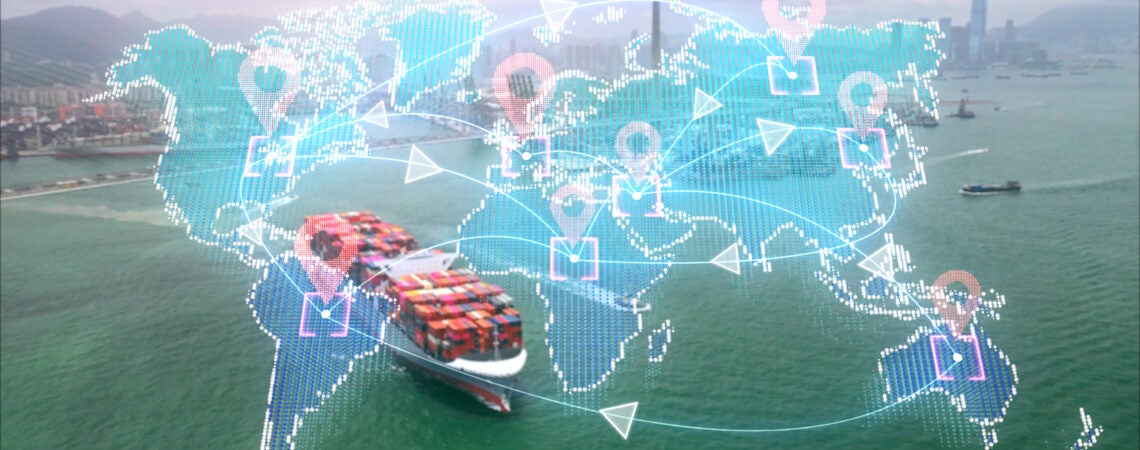On the 14th June, the largest container ship in the world – HMM Algericas – docked at London Gateway port on the Thames. Bringing imports from China, via South Korea and Northern Europe, HMM Algericas was on her maiden voyage, one of a new breed of colossal ‘Megamax-24’ container ships. These megaships are 400 metres long and over 60 metres wide, with an optimised hull and highly-efficient engines that are designed to cut carbon emissions from global container shipping. But their mammoth bulk belies profound uncertainty over the trade they carry. Are they the avatars of a new wave of low carbon post-pandemic global trade, or the behemoths of a now defunct model of globalisation, consigned to history by trade wars, climate change and Covid-19?
The coronavirus crisis has cut deep into global trade flows. The ‘Great Lockdown’ has shut borders, curtailed consumer demand, and broken supply chains. Ports have been closed and international travel has virtually ceased. The global economy is set to shrink by 6 – 8 per cent in 2020, and world trade by up to 12 per cent. Yet ‘slowbalisation’ was already taking hold in the global economy before Covid-19 jumped from a bat to a Hubei farmer sometime in late 2019. Global trade rose only marginally faster than global output in the decade after 2010, having risen at more than twice the pace of output in the early 2000s. The share of Global Value Chains in trade fell during the same period. Rising protectionism, the US-China trade war, automation and increased domestic production, all took their toll on the model of globalisation that had structured world trade in the ‘long 1990s’ before the financial crisis.
In a wide ranging interview with the Financial Times, French President, Emmanuel Macron, declared that this model of globalisation had reached ‘the end of its cycle’. It had lifted millions out of poverty and deposed totalitarian governments, but had also increased inequality and undermined democracy, he argued. The Covid-19 crisis has accelerated this reassessment.
National governments are now taking stock of their economic resilience against future pandemics. Can they build or get enough ventilators, masks, personal protective equipment and diagnostic tests, and produce vaccine supplies? Do they have national control over strategic sectors, like pharmaceuticals and telecommunications, as well as defence? The German government recently bought a 23 per cent stake in Curevac, a biotech company based in Tubingen that is developing a Covid-19 vaccine, in order to block a US takeover. Macron has declared that France will seek ‘medical self-sufficiency’ and is investing in national research and production capabilities. And pandemic preparedness bleeds easily into geo-political industrial strategy: the EU commission has set out plans to block access to public procurement contracts from state-subsidised Chinese companies. It now describes China as ‘systemic rival’ to the EU.
Industrial and commercial concerns are increasingly overlaid by foreign and security policy objectives. The US is challenging its allies to come into line behind its attempts to constrain and contain China, citing security concerns for pushing prohibitions on Huawei in 5G development, blocking involvement in China’s Belt and Road initiative, and limiting foreign investment by Chinese companies. The Johnson government has launched ‘Project Defend’ – an examination of the UK’s national capabilities for producing essential supplies and an assessment of its economic vulnerability to hostile governments. It has folded the Department for International Development back into the Foreign and Commonwealth Office, largely on trade and security grounds. Much of this is code for rethinking the UK’s relationships – both economic and political – with China. The shifts in government policy reflect rising hostility to China on the Tory backbenches, of which the formation of a new hawkish ‘China Research Group’ is emblematic.
Emerging from the pandemic, world history will have two main vectors: climate change and strategic competition between the US and China. Where does this leave ‘Global Britain’?
Brexit was a political project launched on the prospectus of opening Britain up to the world, uncoupled from the EU’s customs union and single market. Even without a slowdown in global trade and the colossal impact of the Covid-19 pandemic, this was always fraught with risk. Geography trumps history in trade, and the cost of erecting barriers to the flow of goods and services with Europe will outweigh any benefits from new free trade deals with the rest of the world. But now the UK government must reckon with pressure to align with the US against China, risking retaliation from Beijing, while simultaneously pulling up the economic and diplomatic anchors of its EU membership. Autarky is not an option. The pandemic has brutally exposed the weakness of both the state’s capabilities and domestic manufacturing in the UK. Nor is an ‘Anglosphere’ alliance of the ‘5 Eyes’ nations of Australia, New Zealand, Canada and USA likely to be more than gestural. Britain will have to find a new place for itself in the world.
Global trade will recover in 2021 but it will not bring back the old model of globalisation. The opportunity exists for governments to use the pandemic as a critical juncture for building a new global order, with the goals of public health, peaceful coexistence, tackling the climate emergency, and distributing economic growth more equitably, at its core. This is a task – as big as anything faced at Bretton Woods – to which a genuinely ‘Global Britain’ might contribute.
Nick Pearce is Professor of Public Policy and Director of the University of Bath Institute for Policy Research (IPR).
To read the original commentary from the University of Bath Institute for Policy Research (IPR), please visit here

